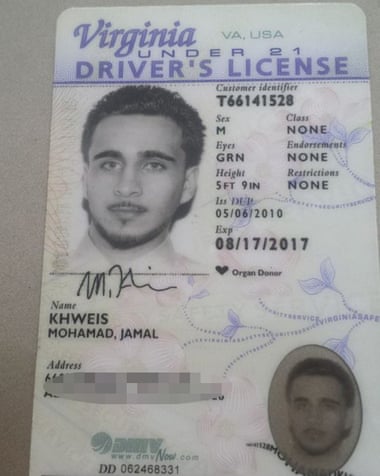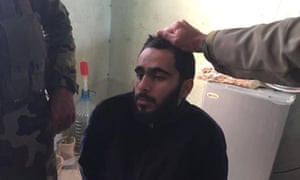American fighting for Isis turns himself in to Iraqi Kurdish forces
The guardianMan identified as Mohamad Jamal Khweis tells Peshmerga forces he escaped from Mosul in rare case of voluntary surrender by an extremist fighter in Iraq
A 26-year-old American fighting for Islamic State gave himself up to Iraqi Kurdish forces on Monday, in a rare instance of voluntary surrender by an extremist militant in Iraq.
The man, identified to the Guardian by Peshmerga sources as Mohamad Jamal Khweis, was detained in the village of Golat, to the east of Sinjar, a city that was retaken by Iraqi forces from Isis militants late last year. Khweis told the Kurdish Peshmerga forces, who are playing a key role along with the Iraqi military in battling the extremist group, that he had escaped from Mosul.
Khweis’s driver’s license, a photo of which was provided to the Guardian, listed an address in Alexandria, Virginia as his home. US authorities have yet to confirm whether he is in fact an American citize
Capt Daham Khalaf, of the eighth brigades of the Peshmerga forces who detained Khweis, told the Guardian that the jihadi fighter approached their position around 4am, having hidden in the overgrown grass. Khalaf said that his unit first tried to shoot the man, assuming he was a would-be suicide bomber.
“We were observing the area where he hid until around 6am, when he came forward and shouted not to fire on him,” Khalaf said.
Khweis handed over his Virginia driver’s license to Khalaf.
Khweis initially told the Peshmerga that he did not speak Arabic, that his father was Palestinian and that his mother was originally from Mosul, said Khalaf, adding that the American militant surrendered unarmed.
“We talked to him for a while and then the Peshmerga intelligence department came and took him away for investigation,” Khalaf said. Khweis is currently being held by the Peshmerga troops for interrogation.
 |
| Mohamad Jamal Khweis’s driver’s license. Photograph: Courtesy Capt Redwan Zebari of the eighth brigades of the Peshmerga forces |
In grainy cellphone footage, posted on social media shortly after Khweis’ surrender, the man is seen on a hillside, standing with his hands behind his back, head slightly bowed. He is surrounded by Iraqi Kurdish troops and responds to an officer’s questions, and confirms he was in Mosul, Iraq’s second-largest city, which has been under Isis control since the jihadi group blitzed across Iraqto capture much of the country’s north and west in the summer of 2014.
A Pentagon spokesman, navy Capt Jeff Davis, said he could not verify that the individual is an American or that he had defected from Isis.
“We are aware of the reports, aware that a US citizen allegedly fighting for Isil has been captured by peshmerga forces in northern Iraq,” he said, using an alternative acronym for Islamic State. “We’re in touch with Iraqi and Kurdish authorities to determine the veracity of these reports. I don’t have any further information to share at this time.”
“We’re just learning of it,” Davis added.
In the neighborhood listed as Khweis’s home on his driver’s license, a man who told the Associated Press that he is Khweis’s father said he was leaving to meet with authorities to find out what they knew. He became angry when a reporter tried to ask him about his son and suggested it was unfair to ask him to account for his grown son.
“He’s 26. Almost 27. He’s a grown man, just like you,” he told a reporter.
Peshmerga Lt Col Jalal Ahmad, who spoke to Khweis in English while he was detained, said that Khweis was bearded and looked “exhausted”.
“We gave him food and he smoked four cigarettes,” Ahmad said, adding that Khweis said he had not been allowed to smoke for the last month in Isis-held territory. Khweis told Ahmad that he had originally travelled through Turkey to reach Isis-held territory.
Khalaf and Ahmad said the American fighter was carrying with him a large amount of cash in different currencies, three mobile phones and three forms of identification, including the driver’s license.
Ahmad did not know how long Khweis had been fighting with Isis.
Though such situations are rare in Iraq, Syrian Kurdish fighters battling Isis in neighboring Syria have told the Associated Press that they are seeing an increase in the number of Isis members surrendering following recent territorial losses.
Last week, Brett McGurk, Barack Obama’s envoy to the US-led coalition fighting Isis, announced that the group had lost more than 3,000 square kilometers (1,158 square miles) of territory in Syria and more than 600 fighters over the past month.
In Iraq, Isis has claimed responsibility for a series of suicide attacks that have killed more than 170 people over the past few weeks. Iraqi officials also say the group has launched a number of chemical weapons attacks.
The attacks follow a string of advances by Iraqi forces backed by US-led airstrikes, including in the western city of Ramadi, which was declared fully “liberated” by Iraqi and US-led coalition officials last month.
Yet despite the airstrikes, the Peshmerga troops, Shia militia units and pro-government Sunni fighters, Isis still controls large swaths of land in Iraq and Syria, and has declared an Islamic “caliphate” on the territory it holds. The extremist group also still controls Mosul, as well as Fallujah.
But as the militants lose territory, US officials predict there will be more desertions.
“As bad things start to happen, the less motivated, less disciplined, less radical elements of the force break and run,” said US army Col Steve Warren. He added that coalition strikes targeting Isis leadership and finances have triggered increased desertions.


No comments:
Post a Comment